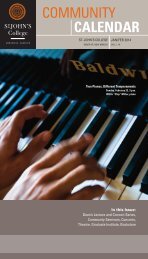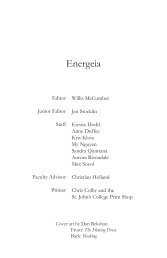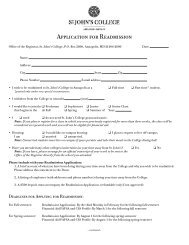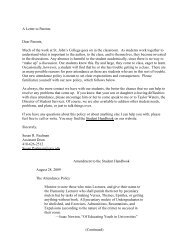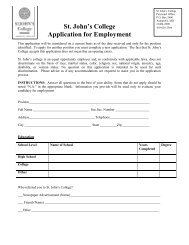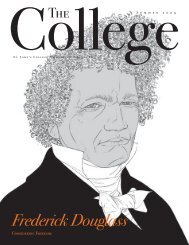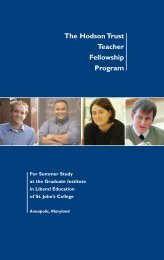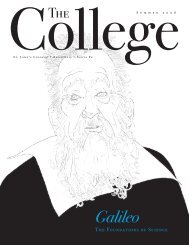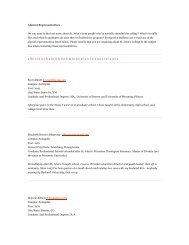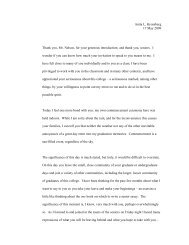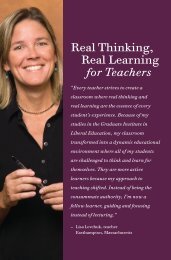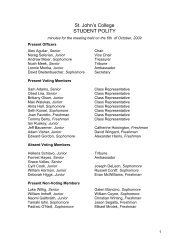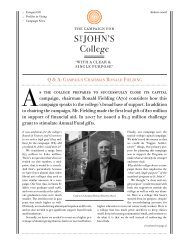âTo Meet with Macbeth,â given by tutor Louis ... - St. John's College
âTo Meet with Macbeth,â given by tutor Louis ... - St. John's College
âTo Meet with Macbeth,â given by tutor Louis ... - St. John's College
Create successful ePaper yourself
Turn your PDF publications into a flip-book with our unique Google optimized e-Paper software.
and colored <strong>by</strong> the poet’s design, for the details of how. Perhaps you would prefer not to see childkilling<br />
on the stage or to imagine unstageable images of it taking place just over there, behind the<br />
curtain. But unless we enlist ourselves in the cause of massacred children <strong>with</strong> face-to-face sympathy, I<br />
do not think Shakespeare would find it artistically possible to put <strong>Macbeth</strong> to the sword. Some tyrants<br />
cannot be killed <strong>by</strong> good people <strong>with</strong>out their deeds having been seen and heard at the worst.<br />
Act II. The Murderer.<br />
Now, in the moonless, starless night, <strong>with</strong> no clocks striking to measure the time, Banquo enters<br />
<strong>with</strong> his son, Fleance, who lights the way <strong>by</strong> torch and tells his father the hour is later than he thinks.<br />
Banquo hands his son his sword and dagger and prays to the “merciful powers” to restrain in him “the<br />
cursed thoughts that nature/Gives way to in repose” (II.i.8-10). (For Banquo has been “hailed” <strong>with</strong><br />
tempting promises of greatness, too.) His words of prayer are the cue for <strong>Macbeth</strong> to enter <strong>with</strong> a<br />
servant who carries a torch. Banquo, not recognizing him, says <strong>with</strong> alarm, “Give me my sword!” which<br />
Fleance promptly returns. <strong>Macbeth</strong> then identifies himself as “a friend” (II.i.9, 11). This double entry<br />
has profound meaning. Banquo has a son to light his way, to hold his sword, and to hand it back upon<br />
need; <strong>Macbeth</strong> has only a servant whom he will send away to bid the Lady strike upon the bell “when<br />
my drink is ready” (II.i.31). The drink, in its effects on the grooms, is their strategy for success in the<br />
murder and thus their ground for hope in the future. The double entry of Banquo and <strong>Macbeth</strong>, <strong>with</strong><br />
and <strong>with</strong>out a son, makes one wonder how much evil that broods in the mind of man is restrained from<br />
performance, as if in answer to prayer, <strong>by</strong> the witness of one’s children, in whose honor fathers keep<br />
their “bosom franchised” and “allegiance clear” and for whose defense they carry the sword and teach<br />
its proper use (II.i.28). Children first appear on this stage as nature’s check on ambition. 9<br />
9 Lady <strong>Macbeth</strong> must know that a woman’s breast properly signifies kindness overruling appetite. Thus she has to<br />
turn her generative capacities into their opposites in order not to be held back <strong>by</strong> them. Even after her unsexing,<br />
Lady <strong>Macbeth</strong> feels restrained from stabbing Duncan because he resembles her father as he sleeps. She thus<br />
watches herself <strong>with</strong> the eyes of the child she once was and that is enough to stay her hand. <strong>Macbeth</strong> does not<br />
serve ambition in the light carried <strong>by</strong> a child. His avail to mark time passing in this black night is drink.<br />
25



